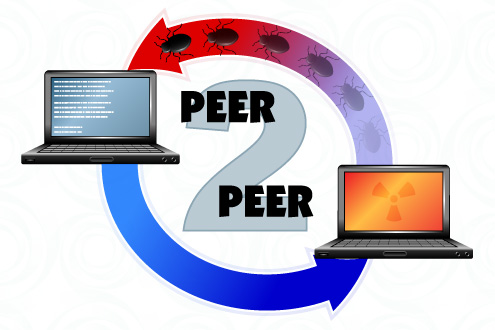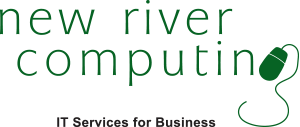The dangers of peer-to-peer-file sharing
Published April 25, 2014

Peer-to-Peer or P2P is a method of sharing of files between two or more computers on the Internet. Users share files via P2P by using peer-to-peer applications such as Gnutella, KaZaA, iMesh, LimeWire, Morpheus, SwapNut, WinMX, AudioGalaxy, Blubster, eDonkey, BearShare etc., and list goes on and on.
How P2P Works
The P2P application takes a piece of allotted data or sometimes whole directories from your hard drive and allows other users to freely download this content, and vice versa. P2P programs are most often used to share music and videos over the Internet. Although sharing, by passing around a CD or DVD is not illegal; sharing by creating multiple copies of a copyrighted work IS illegal. Some P2P programs will share everything on your computer with anyone by default. Much of the P2P activity is automatic and its use is unmonitored. Computers running this software will be busy exchanging files whenever the machine is turned on. Using P2P software can be, and often is very dangerous.
Consequences of Copyright Infringement
Downloading and sharing files which contain copyrighted material is against the law. The responsibility to restrict sharing and monitor the legality of files on your network lies solely with you and/or your employer (if it takes place at work using company equipment).
This is what can happen:
- Legal consequences. Copyright holders may offer a legal settlement option or pursue legal action against you.
- Financial implications. If a copyright holder chooses to pursue legal action, the minimum damage for sharing copyrighted material is $750 per file (in addition to legal and court fees). According to several different news sources, individuals who settled their cases outside of court were forced to pay substantial amounts. There is no way to predict how much you may be required to pay in settlement costs if illegal files are found to be on a machine or being transferred to/from an IP address that you own.
The Digital Millennium Copyright Act (DMCA) makes it a crime to create software that helps distribute copyrighted materials. It also limits an Internet Service Provider’s (ISP) liability if the ISP notifies the alleged infringer and suspends access to illegal copies of copyrighted materials.
There Are Risks Associated With Using P2P Programs
Some of the P2P programs themselves contain “spyware” that allows the author of the program, and other network users, to see what you’re doing, where you’re going on the Internet, and even use your computer’s resources without your knowledge to carry our various activities –the most popular use at this time is to harvest computer power to mine Bitcoins. Another annoyance with this type of software is that once installed, these applications can be almost impossible to remove. In some cases a user has to know which files to remove and which registry entries to edit to completely get rid of the application. Content downloaded via P2P applications can be potentially laced with malware, be legally protected copyright data or be personal and/or private information. Tests carried out by various researchers have revealed that common P2P searches often contain very sensitive, private data including: patent applications, medical information, financial and other personal and business-related information.
Since the computers running the P2P programs are usually connected to a network, they can be used to spread malware. Another risk is that various types of illegal files can be downloaded and re-shared over P2P networks by mistake. Users can even have files placed on their machines without knowing by others who want to share illegal material without getting caught. This tactic allows nefarious users “spoof” their personal network and IP address information. Short explanation: they use YOUR computer network to distribute and share THEIR illegal material so, it’s traced back to YOU and not THEM. So, in the end, YOU will be the one getting the knock on the door from law enforcement.
“Stealing is Stealing and Wrong is Wrong”. There’s no need to use P2P software to enjoy music and movies. There are multiple free and LEGAL options available to watch movies and listen to music. While most of these free services are ad-supported, many also offer very low cost subscription options that, in my personal opinion, are worth every penny and are ad-free!
Legal Alternatives for Downloading
Some of the sites listed here, provide some or all content at no charge. They are funded by advertising or represent artists who want their material distributed for free. This is not an exhaustive list but, it’s a good place to start.
TV shows: Watch TV shows online legally and free->> Hulu TV
Music Listen to music online legally and free->> Pandora (personal favorite), Last.fm , I Heart Radio, Xbox Music and Spotify.
Remember that it’s important to delete any files on any machines which may have been obtained over a P2P network and to also remove the P2P software. Use caution while surfing the internet and use some of the legal alternatives mentioned above for consuming media. If you suspect users on your business network of using P2P software, please don’t hesitate to contact New River Computing for support.
As always, STAY SAFE!
Search Posts
Recent posts
Categories
Archives
- February, 2025 (1)
- December, 2024 (1)
- January, 2024 (1)
- December, 2023 (1)
- November, 2023 (1)
- September, 2023 (1)
- July, 2023 (1)
- May, 2023 (1)
- April, 2023 (1)
- March, 2023 (1)
- January, 2023 (1)
- December, 2022 (1)
- November, 2022 (1)
- February, 2021 (1)
- March, 2018 (1)
- February, 2018 (1)
- October, 2017 (1)
- June, 2017 (1)
- April, 2017 (1)
- April, 2016 (1)
- February, 2016 (1)
- October, 2015 (1)
- July, 2015 (1)
- March, 2015 (2)

